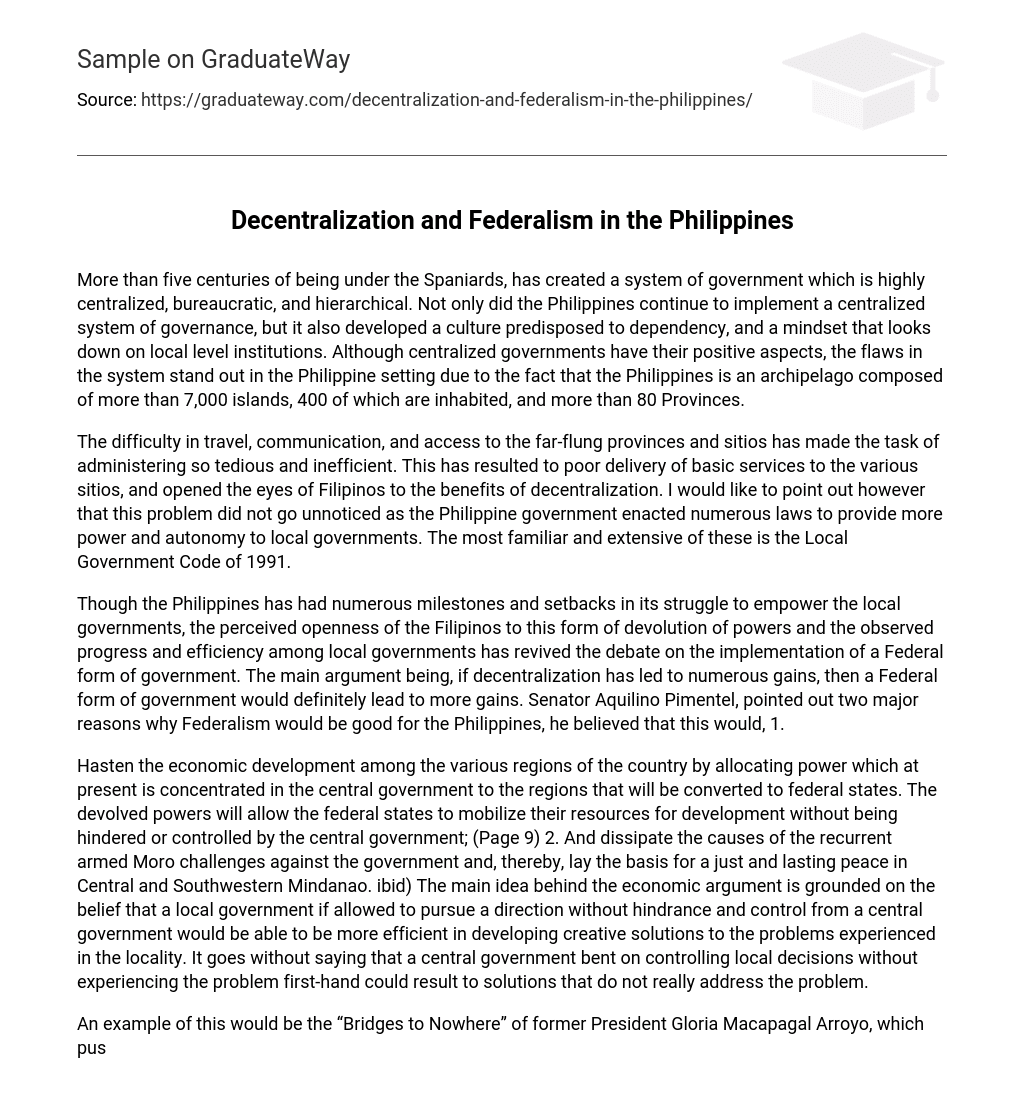The Philippines has been under Spanish rule for over five centuries, resulting in a highly centralized, bureaucratic, and hierarchical system of government. This has also led to a cultural inclination towards dependency and a disregard for local-level institutions. While centralized governments have their advantages, the flaws in this system are particularly evident in the Philippines’ unique geographical makeup, with over 7,000 islands, of which 400 are habitable, and more than 80 provinces.
The challenges in travel, communication, and reaching remote provinces and sitios have made the administration task arduous and ineffective. As a result, basic services delivery to various sitios has suffered, prompting Filipinos to recognize the benefits of decentralization. It is notable that the Philippine government acknowledges this issue and has enacted multiple laws to bestow greater authority and independence on local governments. The Local Government Code of 1991 stands out as the most renowned and comprehensive among these laws.
The Philippines has experienced both accomplishments and difficulties in its endeavors to empower local governments. However, these experiences have sparked renewed conversations about transitioning to a Federal form of government due to the country’s acceptance of devolution and advancements in local governance. The main argument is that if decentralization has already yielded considerable benefits, it is believed that a Federal government would bring even more significant advantages. Senator Aquilino Pimentel emphasized two primary reasons why adopting Federalism would be beneficial for the Philippines: 1.
The aim is to accelerate economic development throughout the country by shifting power from the central government to regional entities, which will transform into federal states. This decentralization of power will empower the federal states to utilize their resources for development without interference or control from the central government. Additionally, this objective encompasses resolving the ongoing armed conflicts with the Moro and establishing a fair and enduring peace in Central and Southwestern Mindanao. The primary rationale behind economic development lies in the belief that local governments, if granted autonomy from the central government, would exhibit greater efficiency in discovering innovative solutions to local issues. Conversely, a central government governing local decision-making without firsthand comprehension of the challenges may propose inadequate solutions that fail to effectively address them. (Page 9)
Former President Gloria Macapagal Arroyo’s “Bridges to Nowhere” is an example of this phenomenon. The project aimed to construct bridges in different provinces but ended up with unfinished bridges and impassable ones during rainfall. While there were rumors of kickbacks being collected by the central government, leading to the incomplete projects, it is evident that the central government’s authority to override decisions and execute projects in local governments can lead to a disconnection between the actual need and the solution.
One reason supporting Federalism is the potential for long-lasting peace in Central and Western Mindanao. However, it is important to acknowledge that this may not be the definitive solution desired, as the secessionist movements in Muslim Mindanao are not advocating for autonomy but rather for an independent nation separate from the Philippines. Dr. Brillantes brings attention to this concern on page 12, stating, “It is crucial to evaluate if a federal state would be seen by the Moros as an acceptable substitute for their separatist objective.”
The future of federalism in the Philippines depends on finding a compromise between the government and the Moros. Despite having pros and cons, it is vital to have a local government that can address people’s needs and create a robust state. This objective can be accomplished by granting them decision-making authority, enabling self-financing, and providing full control over fund allocation.
By implementing Federalism in the Philippines, there could be considerable advantages. It would provide a state with full autonomy while maintaining reliance on the central government for financial support. This arrangement would empower Filipinos to cultivate their respective regional cultures, which are currently overshadowed by the promotion of a singular “National Culture” and have resulted in confusion among citizens.
The Philippines highlights its multiculturalism by including different regional groups, Indigenous people, and the Moros of Mindanao. The implementation of a Federal State has the potential to promote a strong sense of belongingness, leading to long-term advantages. While Federalism may not provide all the solutions to the country’s problems, it does guide us in the correct direction.





